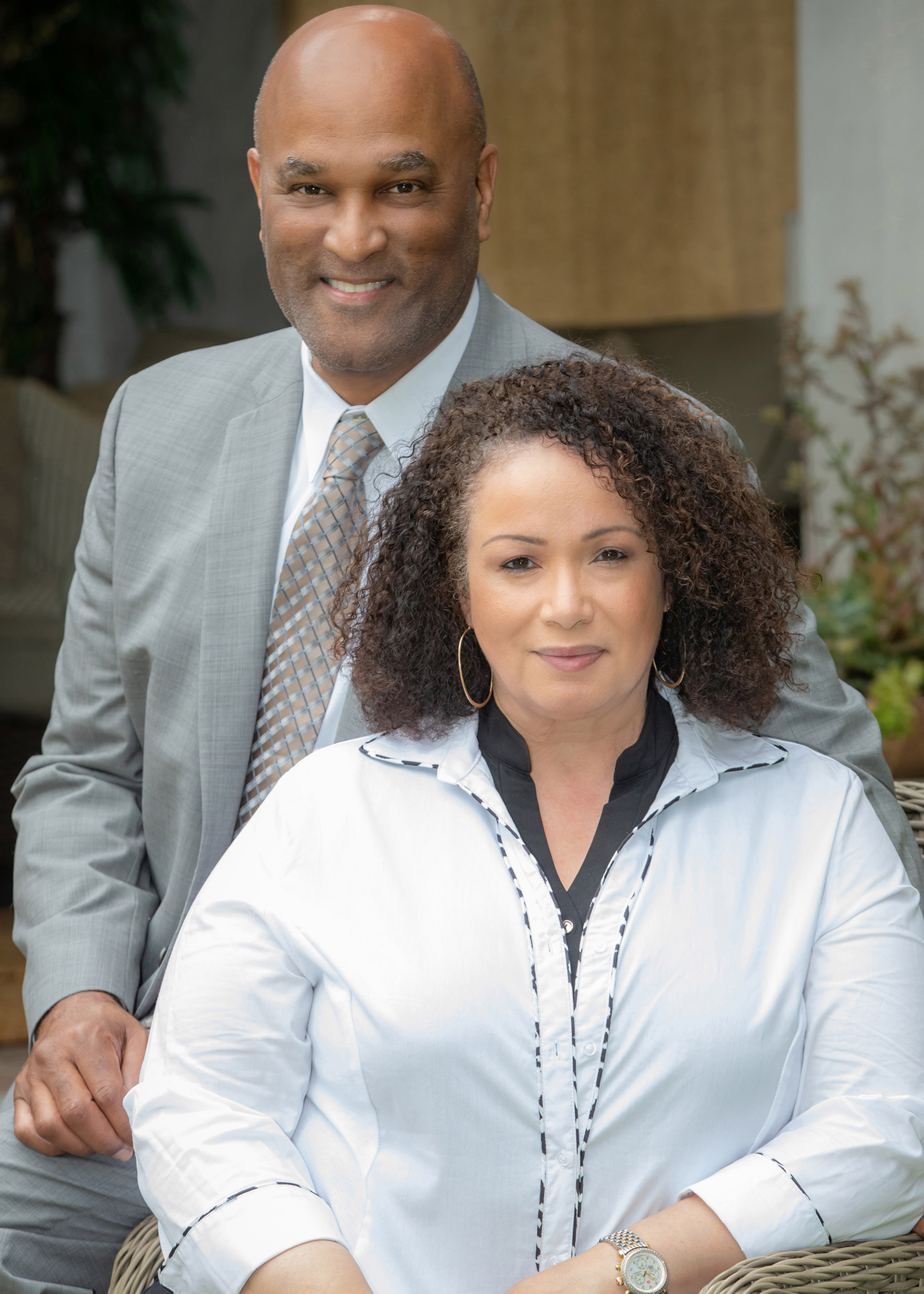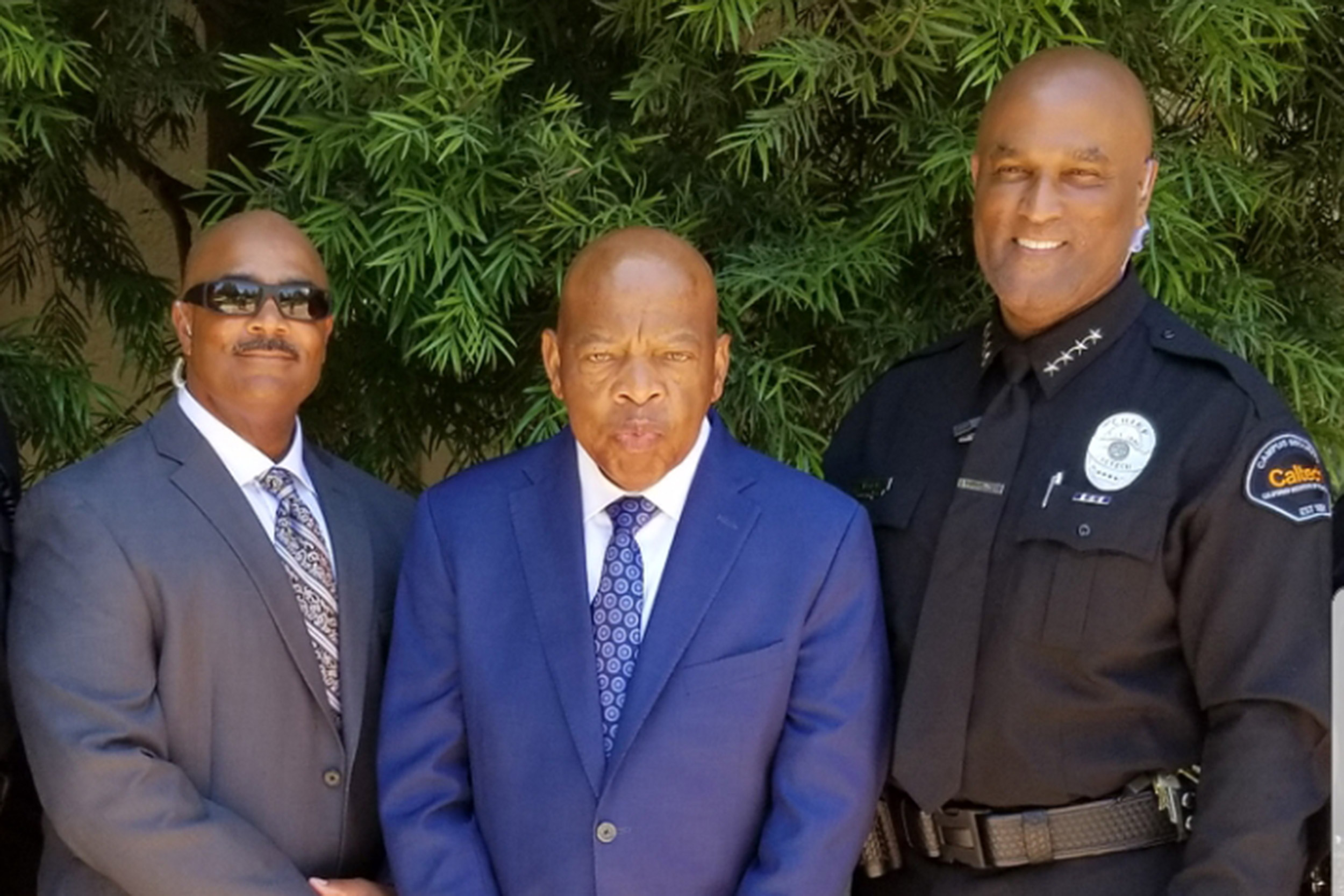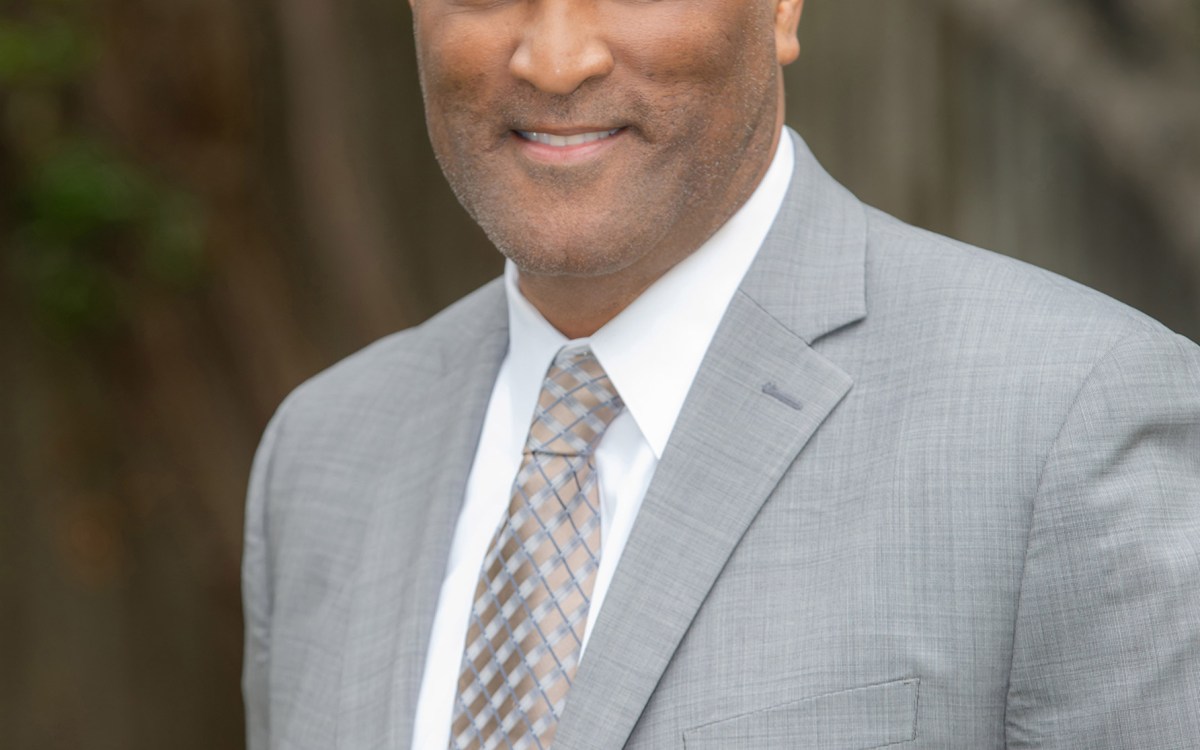Police need to see themselves and be seen as a part of the community
New chief aims for more transparency, communication, involvement, inclusion of views

Victor Clay and his wife Teree.
Photo by Curtis Dahl
Today, the University announced the appointment of Victor Clay as the new chief of the Harvard University Police Department. Clay comes to Harvard from the California Institute of Technology (Caltech), where he was chief of campus security and parking services. Previously, Clay led campus security at Occidental College, and he began his career in the Los Angeles County Sheriff’s Department, where he was awarded the meritorious conduct medal.
More like this
“At a moment of national reckoning about the relationship between police departments and the communities that they serve and protect, we are thrilled to welcome a leader who understands the challenges and opportunities of reimagining public safety,” wrote President Larry Bacow and Executive Vice President Katie Lapp, in a letter to the University community.
The Gazette spoke with Clay about the current nationwide reckoning with police violence against people of color, the importance of supporting the increasingly diverse populations found on college campuses, the role of the police in higher education, and what community policing means to him.
Q&A
Victor Clay
GAZETTE: Your hiring comes at a crossroads with regard to the role of law enforcement in our country. People of color continue to unjustly lose their lives in interactions with police despite ongoing protests and calls for change, sparked most recently by the murder of George Floyd last May. A jury in Minneapolis last week found Derek Chauvin, a white former police officer, guilty of killing Floyd. Two other young people of color, Daunte Wright, 20, and Adam Toledo, 13, were killed by police in high-profile, unrelated incidents just during the course of the monthlong trial. What are your thoughts on the verdict, and what needs to happen with regard to change?
CLAY: I think the verdict was right on all three charges. My fear is that some people will consider the verdict a “victory” and others an injustice. It doesn’t escape me that even after seeing the Floyd killing on videotape, the story being a major part of our 24-hour news cycle, a really solid case by the prosecution, and multiple eyewitness and expert witness accounts, that there was still the sense of “I hope they do the right thing” even the moment before the verdict was read. That is what I think about. Did it move the needle at all? I hope so.
“It’s time for us as law enforcement leaders to own these mistakes publicly and correct them, to change the culture within our departments, and to truly show compassion and integrity. After all, we work for our communities.”
It’s really sad that these killings continue to happen. Most of us, as law enforcement officers, know exactly what is right and what is wrong. When we critique our tactics inside of our briefing rooms and our training spaces, we admit our mistakes, and we try to fix them. But that’s not widely known outside of our station walls. So, when heavily edited and scripted statements are made, we appear to be defending the poor performance and wrongs that occur, even when these wrongs are captured on video. From my perspective as a Black man, listening to these police departments and municipalities responding to these killings, nobody wants to hear canned responses about how sorry people are anymore. We want to see actual change.
It’s time for us as law enforcement leaders to own these mistakes publicly and correct them, to change the culture within our departments, and to truly show compassion and integrity. After all, we work for our communities. The nature of our business is, or should be, steeped in selfless service to others. We need to reestablish that value and regain the trust of the people we serve.
GAZETTE: The phrase “community policing” has become popular in terms of how various towns, cities, and other entities such as institutions of higher education are rethinking the roles of their police departments. You have built up a long career serving diverse communities across Los Angeles County as a member of the largest sheriff’s department in the world, and now, in higher education, at Occidental College and Caltech. Tell us more about what community policing means to you, and how important it is to maintaining a safe environment in the community in which you serve.
CLAY: During my interviews for this position, I actually said that I don’t like the term “community policing.” To me, it sounds too much like a slogan or something that you have to add to policing. In truth, in my opinion, the true essence of law enforcement and policing is based in the community. If things are working the way they’re supposed to, you shouldn’t even have to have a phrase like this.
Problem is, policing hasn’t worked right, for decades, even centuries. Some departments have responded by trying to do the right thing, establishing community-oriented policing teams. But often, even these don’t work. They become overtime-generating machines, and the spirit for which they’ve been intended goes right out the window.
To me, the community has to be where you begin. You and everyone within your department needs to become a part of the community. And this message needs to come from the top, from whomever oversees the department. And I intend for that message to come from me as I begin at Harvard.
GAZETTE: Can you explain how you’ve been able to connect with the community in past positions?
CLAY: So, both at Caltech and Occidental, and in my Sheriff’s Department life, I’ve always lived in the area where I work. I like to think about that Hair Club for Men commercial, “I’m not only the president, I’m a member.” I, too, actually, rely on the department’s services. My commitment is not just to the community, and it is not only professional, but it’s personal, because my own family, and the people I love, have to be served at the highest level.
You know, it’s a different level of policing when you have to go to the grocery store, or a gas station, or a post office in the community you serve after you get off of work. You have to be there, communicate with people, answer their questions, even when it’s hard. And I ask for a similar level of commitment from my officers, even, as we say at Caltech, when it’s so cold, wet, and miserable that you want to give up, you have to stay committed. You have to walk it like you talk it.
GAZETTE: Higher education is deeply engaged in the national conversation on the role of the police in providing for campus safety. It’s certainly relevant on campus: Should the police always respond to a call? Are there certain instances where it’s fine for somebody in the dorms to respond, or a mental health provider who would be better suited to the task? The recent External Review of the HUPD conducted by 21CP Solutions suggested that Harvard should reimagine the role of the HUPD. What are your thoughts on this?
CLAY: I love this question, to be honest with you. I started as a police officer in 1984, and those of us in law enforcement have long held the same complaint about the police being called too often.
Some examples: a noise complaint inside a residential home? That’s not a cop-worthy response on a campus, right? That’s a resident adviser’s responsibility. It’s the same thing, like if you live in an apartment complex, and your neighbors are making noise, you reach out to your neighbor first. If that doesn’t work, you call the apartment manager.
It’s so important that mental health resources be in place. At Caltech, our officers trained with the Office of Student Wellness Services to better understand the various issues students can experience and to know how to best respond to these situations. Sometimes, this means bringing in a mental health professional. Police have limited resources, limited training, and limited time when managing incidents involving mental health crises. We can make sure the environment or scene is safe, but people trained in managing mental health issues need to take the lead on those types of incidents.
Victor Clay (far right) with Rep. John Lewis and Gregory Powell, Clay’s second-in-command at Caltech. Lewis spoke at Caltech’s 2018 commencement.
Courtesy of Victor Clay

GAZETTE: You’ve made some substantial changes with regard to how the security departments at both Occidental and Caltech interact with students. Tell us about some of these changes.
CLAY: While at Occidental, we were challenged by student-led groups to be more transparent and to answer their questions about policing, specifically the militarization of police/security on campus, and rightfully so. It was contentious at first, and several conversations were quite heated at times. But, the students and some faculty had every right to demand a specific type and level of “policing” on campus. We served them, so we needed to make adjustments. That said, I did require that the safety of my staff must also be considered in any adjustments to our activities — we can always discuss and meet somewhere in the middle.
We also established a Chief’s Advisory Committee, and we held town hall meetings to discuss these issues, and others. I thought it went well. Speaking to the students essentially gave me a roadmap to success. I knew what they wanted; I knew what we could deliver; and we made changes accordingly. Plus, we were able to show our commitment to changing the culture of the department and to increasing the service that we provided.
Some of the immediate changes we made at Occidental were: including students in security planning, changing our uniforms to polo shirts and cargo-pocket-style patrol pants, and adjusting our patrol methods to one of guardianship versus rigid “letter of the law” enforcement. We partnered with student affairs and asked that they take a lead role in enforcing conduct violations, while we focused on crimes and investigations.
At Caltech, I did essentially the same things. The department appearance changed with new uniforms, our patrol cars received a makeover to match the logos and insignia of Caltech, and we met with student leaders to address their specific concerns. We included students in some of our training, and we joined them in some of their trainings and activities. We also included event organizers and student affairs leadership in the planning phase prior to events on campus, and we asked them to take the lead on conduct-related issues.
Working together is always better, as it increases communication and improves relationships, both of which are incredibly important, especially during these difficult times. I hope to recreate that level of communication and community at Harvard. I know there is a recently established HUPD Advisory Committee, and I plan to be a very active and responsive member of that group.
GAZETTE: Let me ask about an important concern of our community, which is becoming more and more diverse. Tell us about your commitment to a more inclusive police department, one that takes into account the reality that many of our community members have had very different experiences with the police in their individual pasts.
CLAY: I’m going to return to what I said about living in the community.
If the police department does not mirror the community in terms of diversity, it should at least be giving it a try. And that’s not about affirmative action or putting somebody in as a token, to be very candid with you.
If the diversity of your department reflects the diversity of the community, you’ll have a department with a better understanding of diverse cultures, which is so important in understanding how to best keep people safe.
I’ve seen the benefit of a diverse department, personally, in my own life. It’s great to see women coming in, in greater numbers. My sister worked with me on the Sheriff’s Department and became this impressive lieutenant working in internal affairs, who retired after 32 years. And you know, as an African American, every time I’m approached by a cop, it affects me. It’s a real thing to feel uncomfortable because I can’t trust that they understand my culture, and that they don’t profile or prejudge me. We need to have a department that is attuned to these concerns, and better understands various points of view on past experiences with the police, good and bad.
GAZETTE: You start officially at Harvard this coming summer. Do you have a sense as to what you plan to do when you arrive on campus?
CLAY: I’ve already had the opportunity to talk to (interim HUPD chief) Denis Downing and I said, “You know, I’m the new guy. I need to learn how to patrol. I need to learn your language, your radio codes, your actual laws. I want to go through the various steps that your newest officer goes through.”
I also want to take the time to talk and meet with people and not just people with power or title, but just folks. I think that’s hugely important. I need to learn what I’m doing, what the environment is, who the people are, what are the strengths and opportunities, then take my time, and begin to make some solid decisions.
GAZETTE: How are you feeling about coming to the northeast after all these years in sunny California?
CLAY: I met my wife when we were 12 years old. We’ve known each other our entire lives. And when I was flirting with her back in high school and telling her that you’re going to be Mrs. Clay one day, we used to talk about moving to the East Coast and traveling and going to different places. I know it’s a couple of decades late now, but we’re seeing this as an adventure and very much looking forward to it.
Interview was lightly edited for clarity and length.





